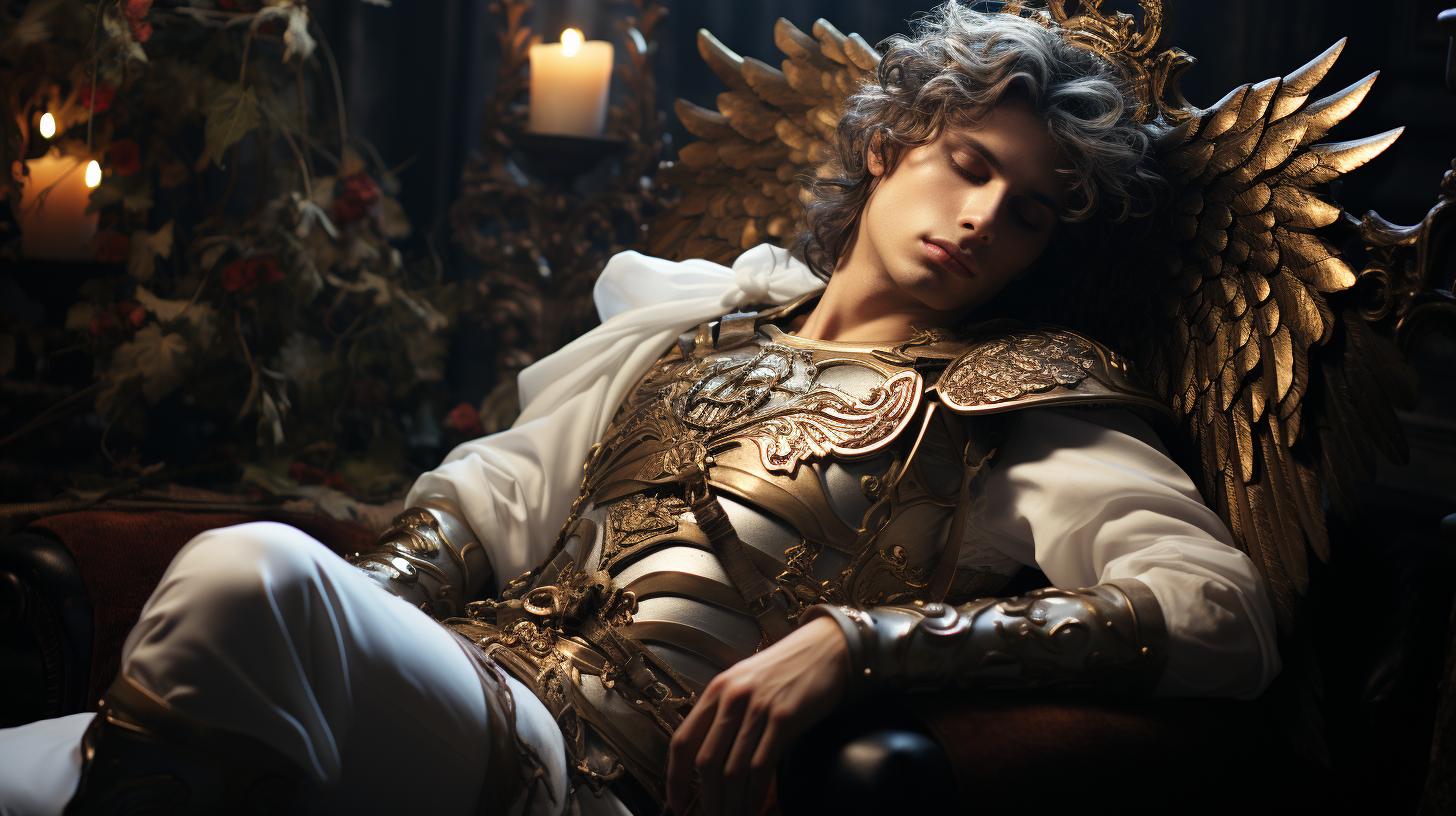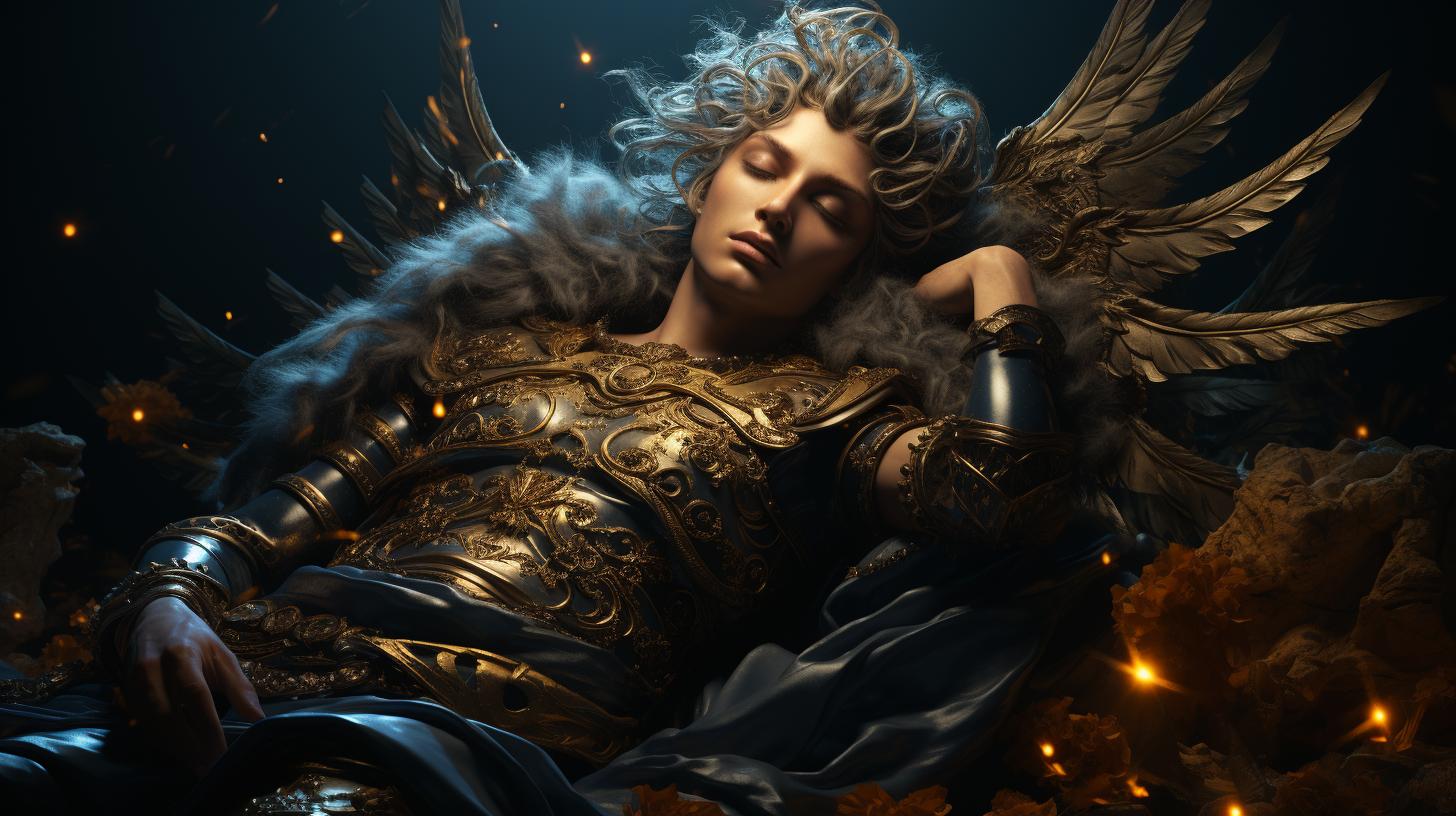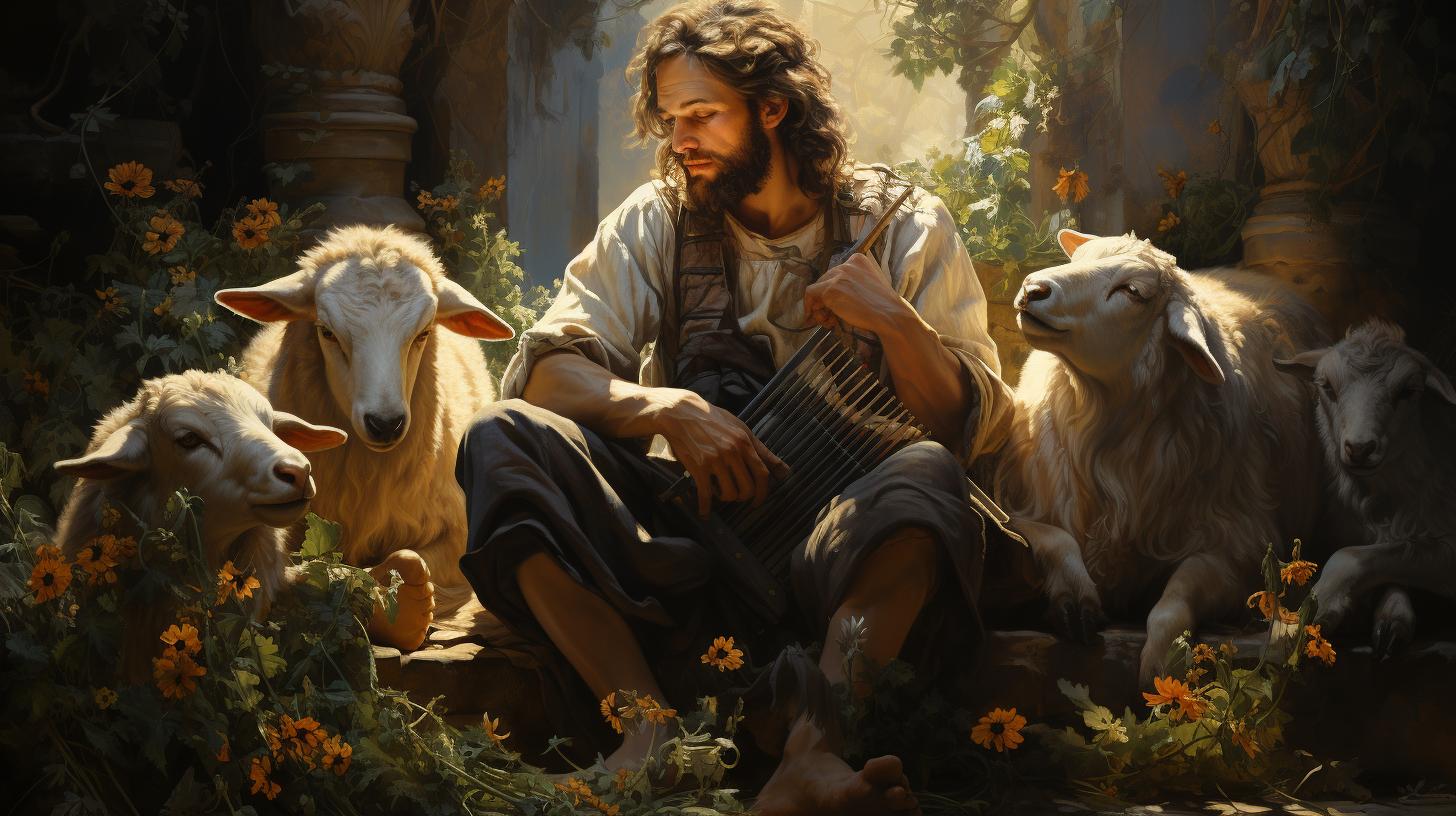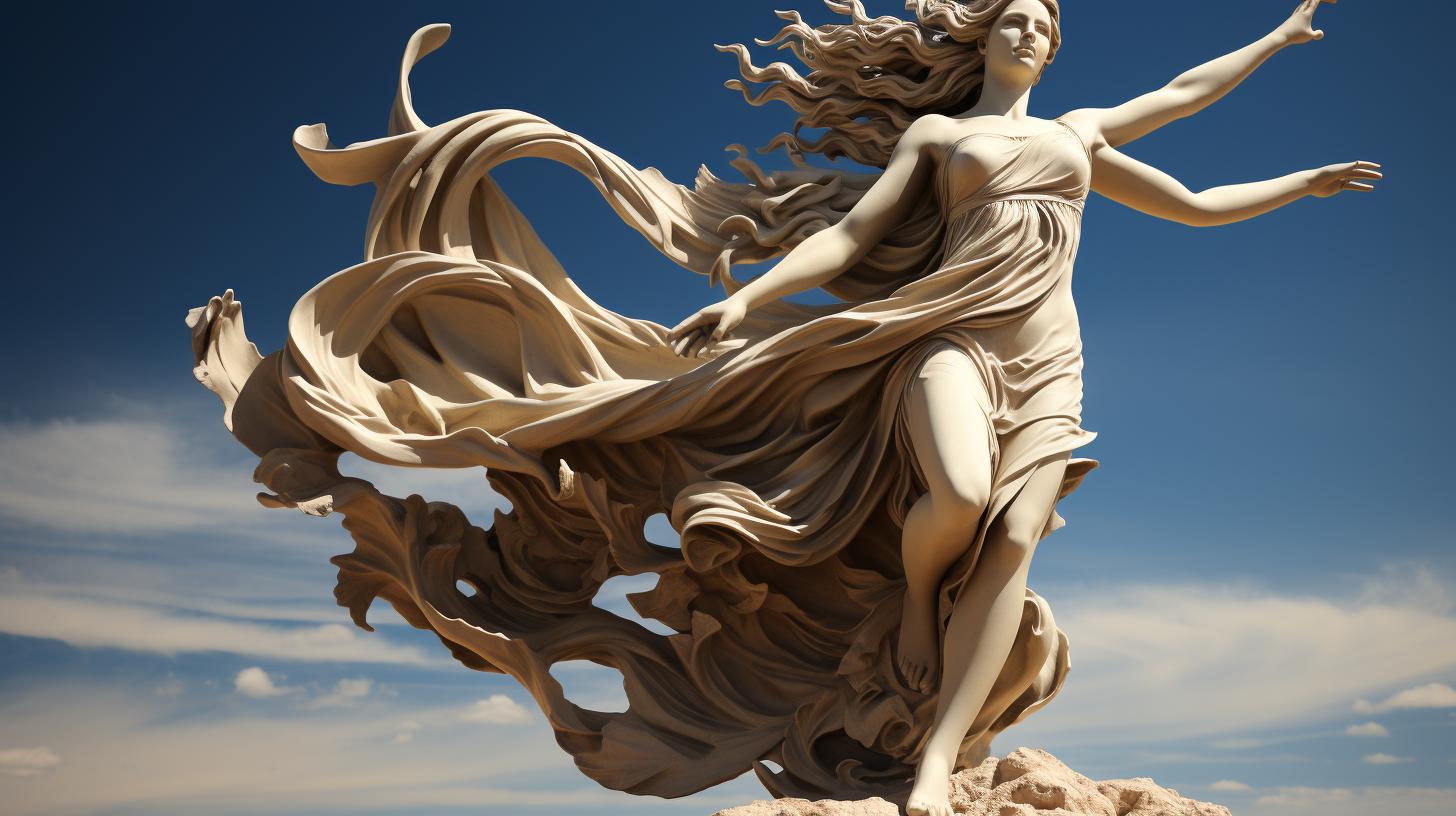Hypnos the Greek God of Sleep: Unveiling the Secrets of Ancient Greek Mythology

Hypnos, the Greek god of sleep, holds a significant place in Greek mythology. He is the son of Nyx (Night) and twin brother of Thanatos (Death). Hypnos resides either in the underworld or on the island of Lemnos, with a dark cave in the land of the Cimmerians mentioned as his abode.
Accompanied by his children, the Oneiroi, who bring forth dreams, Hypnos finds his purpose in aiding humans and even played a role in the Trojan War. Represented with wings, his appearance is tied to symbols of sleep-inducing opium and the flowing Lethe river.
The intriguing legacy of Hypnos continues to captivate and influence popular culture.
Hypnos and his Family
Hypnos, the Greek god of sleep, is a prominent figure in Greek mythology and is part of a fascinating family lineage. His mother, Nyx, is the primordial goddess of the night, representing darkness and shadow.
Nyx is not only the mother of Hypnos, but she is also the mother of many other powerful deities.
Nyx, the Mother of Hypnos
Nyx holds a significant place in Greek mythology as the personification of night. She is often portrayed as a powerful deity with dark wings and a somber aura. Nyx’s association with darkness and the night represents the primordial forces that preceded the creation of the world.
Thanatos, the Twin Brother
Hypnos has a twin brother named Thanatos, who personifies death. While Hypnos represents sleep, his brother embodies the finality and inevitability of death. Together, they form a dualistic pair that influences the cycle of life and mortality.
The Role of Hypnos in Greek Mythology
Hypnos plays a crucial role in Greek mythology, particularly in relation to the realms of sleep and dreams. He is responsible for the peaceful slumber that envelops both gods and mortals.
Hypnos’ ability to induce sleep creates a bridge between the waking world and the realm of dreams, leading to numerous fascinating tales and interactions.
As the god of sleep, Hypnos has a unique power that affects the lives and experiences of both humans and immortals.
His presence can be found in various Greek literary works, religious practices, and even in popular culture today.
- Nyx, the primordial goddess of the night, is the mother of Hypnos.
- Hypnos has a twin brother named Thanatos, who represents death.
- Hypnos’ role is crucial in Greek mythology, governing sleep and dreams.
Hypnos in Greek Literature
Delve into the captivating portrayal of Hypnos in Greek literature, where his presence and influence are vividly depicted in various ancient works.
Homer’s Iliad: Hypnos’ Involvement in the Trojan War
In Homer’s epic poem, the Iliad, Hypnos plays a crucial role in the Trojan War. He is called upon by Hera to lull Zeus to sleep, thus providing an opportunity for the gods to intervene in the conflict between the Greeks and Trojans.
Hypnos’ ability to induce deep slumber becomes a pivotal strategy in shaping the outcome of the war.
Hesiod’s Theogony: Hypnos’ Genealogy and Origins
Hesiod’s Theogony offers insight into the genealogy and origins of Hypnos. He is identified as the twin brother of Thanatos, both born from Nyx, the primordial goddess of night. These mythical origins serve to establish Hypnos’ unwavering connection to the realm of sleep from his very inception.
Pausanias’ Description: Places Associated with Hypnos
Pausanias, in his writings, provides vivid descriptions of places associated with Hypnos. These include references to the dark cave where Hypnos resides, possibly located in the Cimmerian land, where the Lethe River flows.
This mystical location, linked to forgetfulness, emphasizes Hypnos’ power over slumber and dreams.
Hypnos’ Appearance and Attributes
Hypnos, the Greek god of sleep, is often depicted in various forms of art and sculpture. Artists and sculptors have sought to capture his essence through creative visualization. Let us explore the different representations of Hypnos and the symbolic attributes associated with him.
Depictions of Hypnos in Art and Sculpture
Artists have portrayed Hypnos in numerous ways, showcasing his divine nature and association with sleep. In their works, he is often depicted as a youthful figure with striking features and a serene countenance.
With wings on his shoulders or forehead, Hypnos exudes a sense of ethereal beauty and tranquility.
Sculptors have captured the essence of Hypnos through various art forms. Statues and reliefs showcase his elegant posture, with a graceful droop of his winged arms.
The intricate details lavished upon his facial expression convey the serenity and peace associated with peaceful slumber. These artistic representations immortalize the god of sleep and offer a captivating glimpse into the ancient Greek world.
Symbolic Representations: Opium, Lethe, and Inverted Torch
Symbolic elements play a significant role in representing Hypnos and his association with sleep. One of the prominent symbols associated with Hypnos is opium, symbolizing the sedative effects that induce sleep.
It represents his power to bring about rest and relaxation, providing respite for both mortals and gods alike.
Another symbolic representation of Hypnos is the river Lethe, which flows through his dark cave.
Lethe is the river of forgetfulness, and its presence emphasizes the aspect of oblivion and tranquility experienced during sleep. The gentle trickle of its waters underscores the soothing and rejuvenating qualities of Hypnos’ realm.
An inverted torch is also attributed to Hypnos, symbolizing the reversal of the wakeful state. As the torch burns downwards, it signifies the transition from wakefulness to sleep, where the conscious mind succumbs to the realm of dreams and rest.
This emblematic representation captures the transformative nature of sleep and its connection to the divine realm ruled by Hypnos.
In conclusion, through art and sculpture, Hypnos’ appearance is depicted as a youthful, winged figure radiating tranquility.
Symbolic representations such as opium, Lethe river, and the inverted torch convey the essence of sleep and its connection to the divine realm. These artistic interpretations allow us to delve into the captivating world of Hypnos, the god of sleep.
Hypnos’ Relationships and Interactions
Hypnos, the Greek god of sleep, had significant relationships and interactions with various deities and figures in Greek mythology. These connections shed light on his importance and role within ancient Greek culture.
Friendship with the Muses
Hypnos held a special bond with the Muses, the nine goddesses of inspiration and the arts. They greatly admired his ability to inspire creativity through dreams. This friendship fostered a reciprocal relationship, as Hypnos often sought their assistance in bringing imaginative and vivid visions to mortals.
Hypnos’ Involvement in Hera’s Plots
Hypnos played a crucial role in several plots orchestrated by Hera, the queen of the gods. One notable instance was during the Trojan War when Hera conspired to put Zeus to sleep, allowing Poseidon to aid the Greeks.
Hypnos transformed into a bird and lulled Zeus into a deep slumber, enabling the success of Hera’s plan.
Hypnos’ Relationship with Pasithea
Pasithea, one of the Charites or Graces, became Hypnos’ wife as a reward for his assistance in the Trojan War. Together, they symbolized the union of restful sleep and gentle relaxation.
Their relationship represented the harmony between restorative rest and the more joyful aspects of life, highlighting Hypnos’ role in rejuvenation and tranquility.
In conclusion,
Through his friendships and collaborations, including his close ties to the Muses and his involvement in Hera’s schemes, Hypnos demonstrated his complex relationships and interactions in Greek mythology. His connections further emphasized his divine significance and his influence in bringing dreams and peaceful sleep to both the gods and mortals.
The Oneiroi: Children of Hypnos
In Greek mythology, the Oneiroi are the children of Hypnos, the god of sleep. They play a crucial role in delivering dreams to mortals, influencing their subconscious thoughts and experiences.
Let’s delve into the significance of the Oneiroi and their connection to the realm of dreams.
The Oneiroi’s Role as Dream Carriers
The Oneiroi, also known as the Oneiroi Oneiroi or the Oneiroi Oneiroi Keres, are the personifications of dreams. They emerge from the depths of Hypnos’ realm to enter the mortal realm, carrying dreams that shape and reveal individuals’ innermost desires, fears, and emotions.
Each Oneiros fulfills a unique role in the dream realm, bringing forth different types of dreams. Morpheus, the most prominent of the Oneiroi, delivers realistic and vivid dreams, often resembling actual events.
Phobetor specializes in bringing nightmares, conjuring terrifying and disturbing visions. Phantasos, on the other hand, presents surreal and fantastical dreams, blurring the line between reality and imagination.
Unveiling the Secrets of Dreams
The dreams conveyed by the Oneiroi hold profound symbolic meanings and can provide insight into one’s psyche.
Ancient Greeks believed that dreams were messages from the gods, offering glimpses into the past, present, and even the future. Interpreting dreams was a common practice, with individuals seeking guidance, warnings, or signs through their dream experiences.
The secrets of dreams have captivated humanity for ages, sparking curiosity and exploration into their hidden depths. Psychologists and philosophers continue to study and analyze dreams, unraveling their symbolic significance and psychological impact on individuals.
The influence of the Oneiroi, as dream carriers, continues to shape our understanding of the intricate world of dreams.
Understanding the role of the Oneiroi and the mysteries they unlock allows us to appreciate the power and importance of dreams in the realm of sleep and beyond.
- The Oneiroi are the children of Hypnos, the Greek god of sleep.
- They deliver dreams to mortals, influencing their subconscious thoughts and experiences.
- The Oneiroi include Morpheus, who brings realistic dreams, Phobetor, who induces nightmares, and Phantasos, who presents surreal dreams.
- Dreams have symbolic meanings, providing insights into one’s psyche.
They were believed to carry messages from the gods.
- Psychologists and philosophers continue to study dreams, unraveling their significance and impact on individuals.
Hypnos and Mortals: Sleep and Healing
Hypnos, the Greek god of sleep, has long been associated with sleep and its healing effects on mortals. Through his interventions, Hypnos provided aid to humans in need and played a significant role in the realm of healing and medicine.
Hypnos’ Aid to Humans in Need
Hypnos, known for his compassion, often extended his assistance to those in dire situations. Mortals facing physical or emotional distress would seek his intervention for soothing and restorative sleep. Hypnos would grant them solace and respite through his sleep-inducing powers, offering relief from pain, grief, and exhaustion.
His calming influence would revitalize weary bodies and ease troubled minds, allowing individuals to heal and regain strength.
Hypnos’ Connection to Healing and Medicine
Beyond providing temporary respite, Hypnos also had a profound connection to healing and medicine. He was believed to possess the ability to initiate the body’s natural healing processes during sleep. It was said that while individuals slumbered under the watchful eye of Hypnos, their bodies would undergo rejuvenation, repairing damaged cells, and restoring balance.
In Greek medicine, sleep was highly regarded as a crucial component of the healing process. The belief in Hypnos’ influence on the body’s healing abilities led to practices like sleep therapy and dream interpretation.
Dreams were seen as a pathway through which Hypnos communicated important insights and solutions to ailments and illnesses. Greek physicians often relied on the interpretation of dreams to diagnose and guide the treatment of their patients.
Overall, Hypnos’ close association with sleep and his role in aiding mortals in their time of need highlights the importance of restful slumber in achieving both physical and emotional well-being. The ancient Greeks recognized and revered the healing power of sleep, attributing it to the influence of Hypnos, the god who held sway over the realm of dreams and rejuvenation.
- Hypnos provided aid to humans in need, offering respite and solace through sleep.
- His sleep-inducing powers brought relief from physical and emotional distress.
- Hypnos’ connection to healing and medicine was based on the belief that sleep facilitated the body’s natural healing processes.
- During sleep, the body underwent rejuvenation and repaired damaged cells.
- Sleep therapy and dream interpretation were practices associated with Hypnos’ influence in Greek medicine.
- Dreams were considered a means through which Hypnos communicated insights and solutions for ailments.
- The healing power of sleep and the role of Hypnos were highly regarded in achieving overall well-being.
Hypnos and the Underworld
In Greek mythology, Hypnos, the god of sleep, has been associated with various places of residence.
Two prominent possibilities are the underworld and the island of Lemnos. While some references suggest his dwelling in the dark caves of the Cimmerians, others allude to his presence in the depths of the underworld itself.
Hypnos’ Possible Residence: The Underworld or Lemnos?
The exact location of Hypnos’ dwelling has been a subject of debate among scholars. According to some accounts, Hypnos resides within the depths of the underworld, a realm ruled by his uncle, Hades. In this version, Hypnos finds solace in the dark and mysterious corners of the subterranean realm, surrounded by the spirits of the deceased and the lesser-known deities.
On the other hand, there are references that point to Hypnos’ association with the island of Lemnos. Located in the Aegean Sea, Lemnos is known for its volcanic landscapes and rugged terrains.
It is believed that Hypnos may have found his abode amidst the secluded beauty of this island, where he can embrace the tranquility and serenity necessary for his role as the god of sleep.
Hypnos’ Relations with Other Underworld Deities
As a deity closely connected to sleep and dreams, Hypnos maintains both familial and functional relationships with other underworld deities. His association with Thanatos, the god of death and his twin brother, is often highlighted.
Together, they traverse the boundaries between life and death, forming an inseparable duo.
In addition to his relation with Thanatos, Hypnos is also known to interact with other realm rulers such as Hades, Persephone, and the Erinyes.
His presence within the underworld serves as a link between the mortal realm and the realm of the divine, allowing for the smooth transition of souls and the harmonious orchestration of the cosmic order.
- Hypnos’ connection with Hades, the ruler of the underworld, signifies his importance in the mythical hierarchy and his role in the afterlife.
- His bond with Persephone, the queen of the underworld, suggests a shared dominion over the realms of sleep and death.
- The interaction between Hypnos and the Erinyes, fierce avengers of the divine order, highlights his role in maintaining the balance and justice within the underworld.
Through his relationships with these underworld deities, Hypnos solidifies his significance in the divine pantheon and reinforces his position as the god presiding over the realm of sleep.
Hypnos in Mythological Epics and Literary Works
Hypnos, the Greek god of sleep, has left a profound impact on various mythological epics and literary works. His character and significance are highlighted in renowned ancient writings, shedding light on his role as a divine deity.
Hypnos in Nonnus’ Dionysiaca and Statius’ Thebaid
In Nonnus’ epic poem, Dionysiaca, Hypnos plays a crucial role in the narrative. He is depicted as a powerful force, utilizing his abilities to induce sleep and dreams, shaping the storyline of the poem.
Hypnos’ interactions with other gods and mortals provide significant turning points in the epic, adding depth and intrigue to the narrative.
Similarly, in Statius’ Thebaid, Hypnos is portrayed as an essential character, contributing to the overall themes of the poem.
His involvement in various divine interventions and his ability to manipulate the state of slumber further emphasizes his importance in the epic.
Hypnos’ Significance in Greek Lyric Poetry
- Pindar: Hypnos’ Role in Celebrating Victories
- Bacchylides: Hypnos’ Influence on Love and Relationships
- Callimachus: Hypnos’ Symbolism in Mythological Context
- Sappho: Hypnos’ Connection to Dreams and Desires
In Greek lyric poetry, including the works of Pindar, Bacchylides, Callimachus, and Sappho, Hypnos is a recurring theme that captures the imagination of the poets.
His representation as the god of sleep intertwines with various aspects of human life, ranging from celebrating victories to exploring the intricacies of love and desire. The poets employ vivid imagery and metaphors to portray Hypnos’ influence, demonstrating his timeless relevance.
Hypnos’ presence in mythological epics and literary works showcases his enduring significance in ancient Greek culture. Through his portrayal in these narratives, readers gain deeper insights into his divine powers and the impact he has on both the mortal and immortal realms.
Hypnos’ Role in Greek Religion and Worship
The worship and veneration of Hypnos, the Greek god of sleep, held a significant place in ancient Greek religion and mythology. Devotees recognized Hypnos as a powerful deity with the ability to induce sleep and bring dreams.
His importance was reflected in various religious practices and beliefs associated with his cult and religious significance.
Hypnos’ Cult and Local Worship
Throughout ancient Greece, various cults and local forms of worship were dedicated to Hypnos. These cults often had specific rituals and ceremonies designed to honor and appease the god of sleep.
Dedicated temples and sanctuaries existed in several cities where believers would gather to seek Hypnos’ blessings.
In these religious settings, priests and priestesses performed sacred rites, including the burning of incense, pouring of libations, and recitation of prayers.
These rituals aimed to establish a connection with Hypnos and invoke his divine presence for a peaceful and restful sleep experience.
Religious Significance in Ancient Greece
Hypnos held immense religious significance in ancient Greek culture. The Greek people attributed the soothing power of sleep to Hypnos, considering it a divine gift bestowed upon them by the god himself.
Sleep was seen as a necessary aspect of human life, providing rest, healing, and rejuvenation.
Ancient Greeks believed that through sleep, individuals could come closer to the divine realm and receive guidance and messages from the gods.
Therefore, Hypnos was venerated as a benevolent deity who enabled this connection between mortals and the divine through the realm of dreams.
It was also believed that Hypnos’ influence extended to the afterlife.
The god played a role in escorting the souls of the deceased to the underworld, ensuring a peaceful transition into the realm of eternal rest. This further emphasized his significance in religious beliefs concerning life, death, and the afterlife.
In conclusion, Hypnos’ role in Greek religion and worship was integral to ancient Greek society. Through various cults and local forms of worship, believers sought the blessings and favor of the god of sleep.
The rituals and practices associated with his cult highlighted the importance and reverence given to sleep as a sacred and divine experience.
Hypnos in Popular Culture
Popular culture has been greatly influenced by the captivating figure of Hypnos, the Greek god of sleep. From literature and film to art and beyond, Hypnos’s presence can be felt in various creative mediums.
Let’s explore how Hypnos has made an impact in modern times.
Hypnos in Modern Literature, Film, and Art
Hypnos’s enigmatic persona has found its way into numerous works of literature, captivating readers with his role as the god of sleep. Authors have woven tales that delve into the magical realm of dreams, often intertwining Hypnos with his children, the Oneiroi.
Notable examples include Neil Gaiman’s “Sandman” series and Rick Riordan’s “Percy Jackson” novels.
The silver screen has also embraced Hypnos, with filmmakers drawing inspiration from Greek mythology. His presence can be seen in movies like “Pleasantville,” where an entire town falls under the spell of eternal sleep, and “Inception,” exploring the depths of dreams and reality.
Hypnos’s influence in cinema extends beyond his role as a god, shaping narratives that examine the power of dreams and the human subconscious.
Artistic representations of Hypnos have similarly captured the imagination of creators, both classical and modern. Paintings and sculptures depict him as a serene figure, often accompanied by his cherished family, the Oneiroi.
Artists have masterfully portrayed the essence of sleep and dreams, bringing Hypnos to life on canvas or in three-dimensional forms. Notable works include John William Waterhouse’s “Sleep and His Half-Brother Death” and Salvador Dalí’s surrealist masterpiece “Dream Caused by the Flight of a Bee.”
Hypnos’ Influence on the Concept of Sleep and Dreams
Hypnos’s enduring presence in popular culture has had a profound impact on the perception of sleep and dreams. Through literature, film, and art, he has become synonymous with the realm of dreams, infusing it with mystery and fascination.
Hypnos’s portrayal has sparked exploration into the subconscious mind, inspiring individuals to delve deeper into the meaning of their dreams and the importance of restful sleep.
The concept of Hypnos has also inspired various theories in psychology and psychoanalysis. His role as the god of sleep has influenced discussions on the nature of dreams, symbolism, and the hidden messages within our subconscious.
Psychologists and researchers continue to draw parallels between Hypnos’s realm and the human mind, uncovering new insights into the significance of dreams and their connection to our waking lives.
- Hypnos’s portrayal in modern literature, film, and art has captivated audiences.
- Authors such as Neil Gaiman and Rick Riordan have incorporated Hypnos into their works.
- Films like “Pleasantville” and “Inception” explore the themes of sleep and dreams with Hypnos as a central influence.
- Artistic representations, including paintings and sculptures, depict Hypnos and his family in serene and mystic settings.
- Hypnos’s influence extends beyond entertainment, shaping discussions on the concept of sleep and dreams.
- The god’s portrayal has inspired exploration into the subconscious mind and symbolism.
The Legacy of Hypnos
The ancient Greek god Hypnos, known as the god of sleep, has left an indelible impact on Greek mythology and religion.
His influence transcends time and has continued to captivate people’s imagination throughout history. This section delves into the lasting legacy of Hypnos, exploring his impact on Greek mythology and religion, as well as the enduring fascination with the god of sleep.
Hypnos’ Impact on Greek Mythology and Religion
Hypnos holds a significant place in Greek mythology and religion. As the personification of sleep, he symbolizes the essential aspect of rest and dreams in the lives of both gods and mortals.
In Greek mythology, Hypnos is often called upon to bring peaceful slumber to characters in need, showcasing his importance in the storytelling traditions of ancient Greece.
Furthermore, Hypnos’ role in the broader Greek pantheon highlights his significance.
As the son of Nyx and brother of Thanatos, he represents a fundamental aspect of the cosmos, reflecting the interconnectedness of life and death. Hypnos’ ability to induce sleep and bring dreams fosters a deeper understanding of the human psyche and the mysteries of the subconscious.
The Enduring Fascination with the God of Sleep
Despite the passage of centuries, the fascination with Hypnos continues to endure. His association with sleep and dreams resonates with individuals across cultures, as these themes remain universally relevant. Hypnos’ representation in art, literature, and popular culture showcases his ability to captivate and inspire creativity.
In art and sculpture, Hypnos is often depicted as a young deity with wings, symbolizing the ethereal nature of sleep. His attributes, including the opium horn and inverted torch, have become iconic symbols associated with tranquility and rest.
From ancient pottery to modern paintings, Hypnos’ image continues to evoke a sense of peacefulness and introspection.
Moreover, Hypnos’ enduring fascination extends to modern literature, film, and art. Writers and filmmakers draw upon the god of sleep to explore the depths of human consciousness, depicting dreams as gateways to hidden desires and fears.
The enduring popularity of works inspired by Hypnos demonstrates the ongoing allure of exploring the mysteries of sleep and the subconscious mind.
In conclusion, Hypnos’ legacy in Greek mythology and religion is far-reaching.
His impact on ancient Greek culture continues to resonate, and his enduring fascination in popular culture showcases the timeless allure of the god of sleep. As we navigate the complexities of the human mind, the influence of Hypnos reminds us of the importance of rest, dreams, and the interconnectedness of the conscious and unconscious realms of existence.
.




















